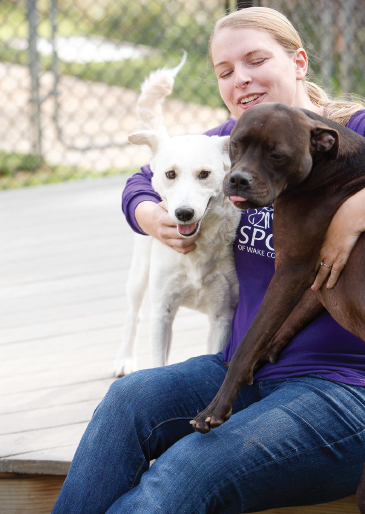While many people claim to be animal lovers and own a pet or two, few dedicate their lives to helping the forgotten and abandoned.
Earning the Maggy Award for Best Charity in Western Wake, as voted on by Cary Magazine readers, the SPCA of Wake County is not your ordinary rescue center.
Walk through the front doors: There are no cages, loud noises or dirty kennels, and the animals welcome you in cheerful manner.
With 36 staff members and 170-plus volunteers, the SPCA of Wake County works tirelessly to save as many animals’ lives as possible. Founded in 1967, the organization places more than 3,000 animals into loving homes every year.

Kim Janzen, the SPCA’s new executive director, said, “I am truly impressed with what this organization is accomplishing, particularly in light of our very limited resources.
“The SPCA of Wake County has a national reputation for its innovation and creativity, and now that I’ve had a chance to work with staff and volunteers, I understand why. I’ve also been impressed with the level of support and engagement from the larger community.”
Because the SPCA of Wake County is a no-kill organization, it only accepts a new pet after another is adopted. That being said, the organization makes a promise to care for each animal until its adoption.
“We want to concentrate on saving the lives of the adoptable animals that are in immediate risk of euthanasia,” said media manager Darci VanderSlik. “As soon as pets are adopted from the SPCA, we are able to go out to rural North Carolina shelters and save as many as we have room for.”

VanderSlik and Janzen find this job to be very rewarding, seeing the transformation of unwanted pets into cherished family members.
There are, however, difficulties that come with the territory.
VanderSlik said, “On a very busy adoption day we send dozens of pets home and the staff walks through the halls of the Adoption Center overjoyed by the number of empty kennels. The hardest part of the job is walking in the next morning and seeing all those kennels full again.”
Janzen agrees.
“We’ve all had those times when it feels like we can’t take even one more day of this work,” she said. “I would worry more if we didn’t have those days, because those feelings of heartbreak mean that we haven’t hardened ourselves to the reality of pet overpopulation and animal abuse.”
Certain animals leave paw prints on staff members’ hearts. VanderSlik describes a black Labrador Retriever puppy rescued from a rural shelter that had been shot in the back and was permanently paralyzed at the hips.
The SPCA took him in, treated his injuries, and purchased a wheelchair to help the puppy move about.

After his story hit the news, he was adopted by a loving family. “Scooter” now has a home with two little girls and a big backyard.
From heartbreaking to heartwarming, the SPCA has seen it all. The organization works to educate the public on ending animal homelessness and stresses the importance of spaying and neutering pets.
VanderSlik said, “The SPCA feels so passionately about spaying and neutering, that in 2009 we opened the Saving Lives Spay/Neuter Clinic, located right next to the SPCA Pet Adoption Center. This is a low-cost, high-volume spay/neuter clinic that can accommodate over 30 spay/neuter surgeries a day. It is open to all pet owners regardless of income or county of residence.”
The SPCA also created an initiative called The Pit Crew to rebuild the reputation of pit bull terriers, rescuing at-risk homeless dogs and putting them through behavior and obedience classes, evaluating their temperaments to better place them in appropriate homes.
The SPCA of Wake County always needs volunteers and monetary donations for medical supplies, along with high-quality dog, cat and puppy food, paper towels, bleach and used blankets and towels.
For more information, visit spcawake.org/volunteer.






